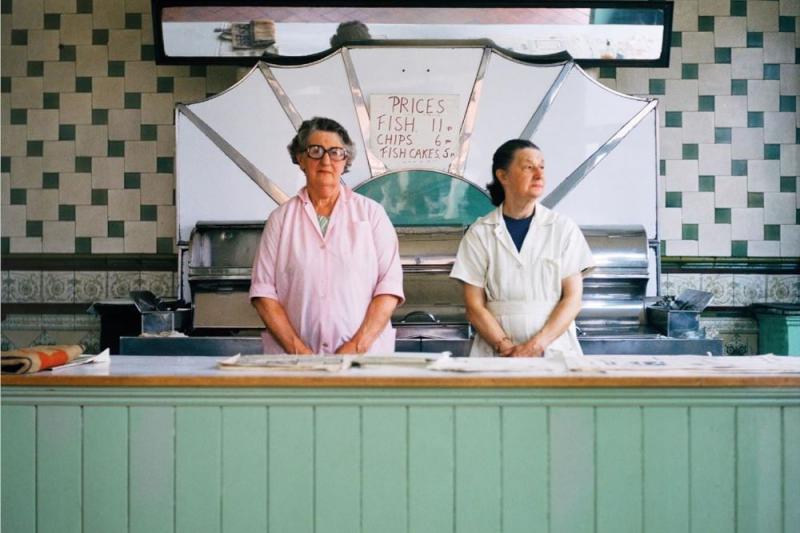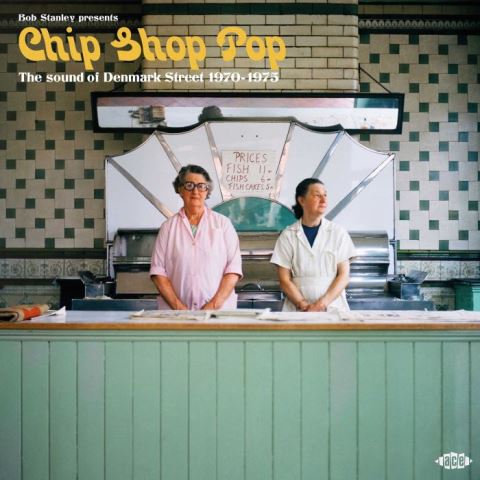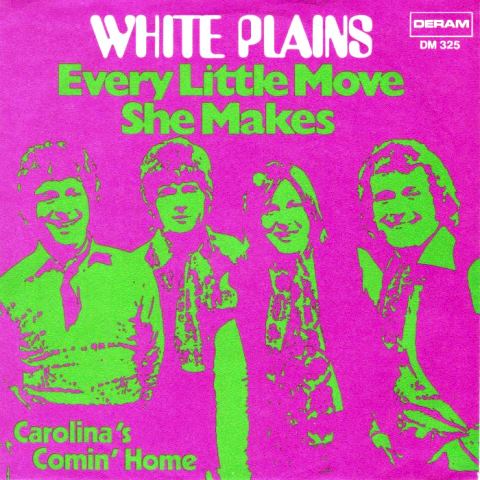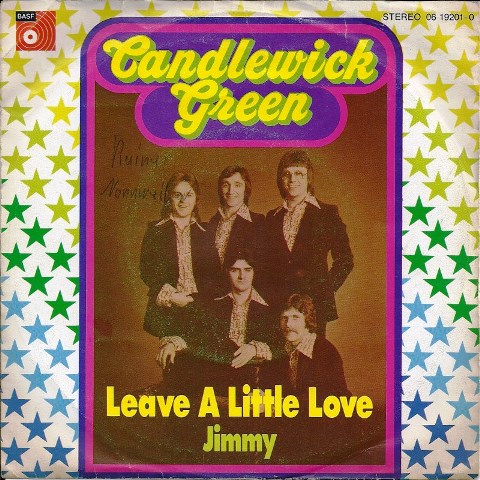Music Reissues Weekly: Chip Shop Pop - The Sound of Denmark Street 1970-1975 | reviews, news & interviews
Music Reissues Weekly: Chip Shop Pop - The Sound of Denmark Street 1970-1975
Music Reissues Weekly: Chip Shop Pop - The Sound of Denmark Street 1970-1975
Saint Etienne's Bob Stanley digs into British studio pop from the early Seventies

One of the more interesting tracks on Paul Weller’s fascinating new cover versions album Find El Dorado is his interpretation of “When You Are a King,” originally a 1971 hit for White Plains, an ensemble which evolved from the touring version of “Let’s go to San Francisco” hitmakers Flowerpot Men. White Plains, it turns out, are represented on another new release.
White Plains are on Chip Shop Pop - The Sound of Denmark Street 1970-1975 with the cascading, harmony drenched “Every Little Move She Makes,” the February 1971 non-charting A-side released between charting 45s “Julie do ya Love me” and “When You Are a King.” Though it sounds like a hit, it wasn’t. As with other White Plains singles, it was produced by the Rogers Cook and Greenaway. The co-writer was with the duo was Tony Macaulay. Prime UK music-business back-room hitmaker credits.
 “My Baby Loves Lovin’” and “Julie do ya Love me” were White Plains' biggest hits. Pure-pop, bubblegum-adjacent singles, they captured a particularly British sound: an upbeat, studio-created pop evoking the fug of a smoke-filled social club as much as the clamour of a seaside fun fair. A music where sunniness is occluded. “When You Are a King” is a more melancholy White Plains, in the spirit of other songs on Weller’s album: The Bee Gees' self-lacerating “I Started a Joke” and Brian Protheroe’s dun-toned, Artex-ceilinged “Pinball.” It is the song which counts here, not the nature of its creation or its non-canonical status.
“My Baby Loves Lovin’” and “Julie do ya Love me” were White Plains' biggest hits. Pure-pop, bubblegum-adjacent singles, they captured a particularly British sound: an upbeat, studio-created pop evoking the fug of a smoke-filled social club as much as the clamour of a seaside fun fair. A music where sunniness is occluded. “When You Are a King” is a more melancholy White Plains, in the spirit of other songs on Weller’s album: The Bee Gees' self-lacerating “I Started a Joke” and Brian Protheroe’s dun-toned, Artex-ceilinged “Pinball.” It is the song which counts here, not the nature of its creation or its non-canonical status.
Another band – who, in a rarity for Chip Shop Pop, were an actual gigging band – on this refined collection are Candlewick Green, with the loosely hymnal, New Seekers-esque April 1974 single “Leave a Little Love.” Written by Des Dyer and Clive Scott, it’s a gem. As was its predecessor single, December 1973’s “Who do you Think you Are?” also a Dyer and Scott composition. The latter was covered in 1993 by Saint Etienne. Chip Shop Pop is compiled by Saint Etienne’s Bob Stanley.
Finding this present-day, not-quite sideways congruence between Saint Etienne's and Paul Weller’s perception of music is, perhaps, surprising. Maybe not. It is the song which counts.
 Chip Shop Pop collects 24 tracks issued over the period signified in the title (all but one were singles; there's a music library album track too). It is marketed as “a stellar collection of super-melodic, expertly crafted songs; it gathers two-dozen of the songs that got away, all potential hits written by these Denmark Street-schooled songwriters. You might have only heard these records once or twice before, coming out of a passing kid's transistor radio, or in the background in a cafe, or a chippie, and then they disappeared into the ether never to be heard again – until now.” Stanley provides entertaining yet erudite annotation.
Chip Shop Pop collects 24 tracks issued over the period signified in the title (all but one were singles; there's a music library album track too). It is marketed as “a stellar collection of super-melodic, expertly crafted songs; it gathers two-dozen of the songs that got away, all potential hits written by these Denmark Street-schooled songwriters. You might have only heard these records once or twice before, coming out of a passing kid's transistor radio, or in the background in a cafe, or a chippie, and then they disappeared into the ether never to be heard again – until now.” Stanley provides entertaining yet erudite annotation.
Some of these singles actually were hits: Fortunes’ “Here Comes That Rainy Day Feeling Again” (a hit in the US though), Kincade’s “Dreams are Ten a Penny” (a hit in Germany). Despite their directness and overt poppiness, seven-inchers by Bitter Almond, Currant Kraze, Scorched Earth and Stormy Petrel didn’t click with record buyers.
As the often eccentric names on the record labels attest, most of what’s on Chip Shop Pop was not recorded by bands in the standard sense. The songs were written and produced by figures who were integral to the music publishers and studios operating from Denmark Street in London’s West End. The songs were recorded by the session players and singers (who could also be the writers or producers) haunting the same street. Once a track was completed, a name was conjured up for the credit. It could be Shorty, Liberty Helm. Or maybe Whiskey Mac. Then, the job of selling this to a record label.
 Amongst those in the credits are Cook and Greenaway, Dyer and Scott, John Carter (the most prolific creator of this type of pop), Wayne Bickerton, Lynsey De Paul, Barry Green (aka Barry Blue), Ken Lewis, Tony Macaulay, Barry Mason, Tony Rivers, Tony Waddington. The singer who crops up most – whatever the credit – is Tony Burrows. Most of the records here were made by what Roger Greenway called a “make up band.”
Amongst those in the credits are Cook and Greenaway, Dyer and Scott, John Carter (the most prolific creator of this type of pop), Wayne Bickerton, Lynsey De Paul, Barry Green (aka Barry Blue), Ken Lewis, Tony Macaulay, Barry Mason, Tony Rivers, Tony Waddington. The singer who crops up most – whatever the credit – is Tony Burrows. Most of the records here were made by what Roger Greenway called a “make up band.”
Fabricating a prospective hit was potentially a cold-blooded, hard-nosed job. But what’s saturating these recordings is energy and joy. Everything sounds as if it was as fun to create as it is to listen to. Just like Motown. Take Chip Shop Pop’s opening cut ”Hello, Hello, Hello.” Credited in 1971 to Stormy Petrel, it was a John Carter creation. Fully orchestrated, it has shades of The Bee Gees, Barry Ryan and the 1969 Beatles at their most dramatic.
Then there’s Brotherly Love’s “Tip of my Tongue,” a 1973 single written by Barry Green/Blue and Lynsey De Paul, and sung by the remnants of Sixties vocal outfit The Carrolls. Had David Cassidy recorded it, it would have topped the charts for weeks. “Lady Pearl,” by Currant Kraze, brought together Roger Cook, Roger Greenaway, Tony Burrows and fellow studio veteran Johnny Goodison. It’s soulful in a Stylistics way, and a delight. All of what’s on Chip Shop Pop – irrespective of its chart status – is as wonderful.
 Another of these treats is the “Goodbye Yellow Brick Road”-predicting “A Little Thing Like Love,” which was issued by CBS as a single on 8 September 1972. Credited to River, co-written by The Hollies’ Allan Clarke and Tony Macaulay, it was sung by former Tony Rivers and The Castaways and Harmony Grass lynchpin Tony Rivers. At this point, he was employed by CBS as a producer and worked from their studio along Whitfield Street, just west of Tottenham Court Road.
Another of these treats is the “Goodbye Yellow Brick Road”-predicting “A Little Thing Like Love,” which was issued by CBS as a single on 8 September 1972. Credited to River, co-written by The Hollies’ Allan Clarke and Tony Macaulay, it was sung by former Tony Rivers and The Castaways and Harmony Grass lynchpin Tony Rivers. At this point, he was employed by CBS as a producer and worked from their studio along Whitfield Street, just west of Tottenham Court Road.
Two days after “A Little Thing Like Love” was in the record racks, Iggy Pop arrived in Whitfield Street to begin producing what would become the Iggy and the Stooges Raw Power album at the same studio.
If only those walls could speak: from a luscious example of Chip Shop Pop to proto-punk in a matter of days. But that’s the chameleonic nature of the music business – where, however it was conceived, one type of music can be as valid, as vital, as another. An understanding shared by Paul Weller and Saint Etienne.
- Next week: Just Like Gold – the surviving recordings of the challengingly named early psychedelic-era San Francisco band The Final Solution
- More reissue reviews on theartsdesk
- Kieron Tyler’s website
Explore topics
Share this article
The future of Arts Journalism
You can stop theartsdesk.com closing!
We urgently need financing to survive. Our fundraising drive has thus far raised £49,000 but we need to reach £100,000 or we will be forced to close. Please contribute here: https://gofund.me/c3f6033d
And if you can forward this information to anyone who might assist, we’d be grateful.

Subscribe to theartsdesk.com
Thank you for continuing to read our work on theartsdesk.com. For unlimited access to every article in its entirety, including our archive of more than 15,000 pieces, we're asking for £5 per month or £40 per year. We feel it's a very good deal, and hope you do too.
To take a subscription now simply click here.
And if you're looking for that extra gift for a friend or family member, why not treat them to a theartsdesk.com gift subscription?
more New music
 Album: Robert Plant - Saving Grace
Mellow delight from former Zep lead
Album: Robert Plant - Saving Grace
Mellow delight from former Zep lead
 Brìghde Chaimbeul, Round Chapel review - enchantment in East London
Inscrutable purveyor of experimental Celtic music summons creepiness and intensity
Brìghde Chaimbeul, Round Chapel review - enchantment in East London
Inscrutable purveyor of experimental Celtic music summons creepiness and intensity
 Album: NewDad - Altar
The hard-gigging trio yearns for old Ireland – and blasts music biz exploitation
Album: NewDad - Altar
The hard-gigging trio yearns for old Ireland – and blasts music biz exploitation
 First Person: Musician ALA.NI on how thoughts of empire and reparation influenced a song
She usually sings about affairs of the heart - 'TIEF' is different, explains the star
First Person: Musician ALA.NI on how thoughts of empire and reparation influenced a song
She usually sings about affairs of the heart - 'TIEF' is different, explains the star
 Album: The Divine Comedy - Rainy Sunday Afternoon
Neil Hannon takes stock, and the result will certainly keep his existing crowd happy
Album: The Divine Comedy - Rainy Sunday Afternoon
Neil Hannon takes stock, and the result will certainly keep his existing crowd happy
 Music Reissues Weekly: Robyn - Robyn 20th-Anniversary Edition
Landmark Swedish pop album hits shops one more time
Music Reissues Weekly: Robyn - Robyn 20th-Anniversary Edition
Landmark Swedish pop album hits shops one more time
 Album: Twenty One Pilots - Breach
Ohio mainstream superstar duo wrap up their 10 year narrative
Album: Twenty One Pilots - Breach
Ohio mainstream superstar duo wrap up their 10 year narrative
 Album: Ed Sheeran - Play
A mound of ear displeasure to add to the global superstar's already gigantic stockpile
Album: Ed Sheeran - Play
A mound of ear displeasure to add to the global superstar's already gigantic stockpile
 Album: Motion City Soundtrack - The Same Old Wasted Wonderful World
A solid return for the emo veterans
Album: Motion City Soundtrack - The Same Old Wasted Wonderful World
A solid return for the emo veterans
 Album: Baxter Dury - Allbarone
The don diversifies into disco
Album: Baxter Dury - Allbarone
The don diversifies into disco
 Album: Yasmine Hamdan - I Remember I Forget بنسى وبتذكر
Paris-based Lebanese electronica stylist reacts to current-day world affairs
Album: Yasmine Hamdan - I Remember I Forget بنسى وبتذكر
Paris-based Lebanese electronica stylist reacts to current-day world affairs
 theartsdesk on Vinyl 92: Marianne Faithful, Crayola Lectern, UK Subs, Black Lips, Stax, Dennis Bovell and more
The biggest, best record reviews in the known universe
theartsdesk on Vinyl 92: Marianne Faithful, Crayola Lectern, UK Subs, Black Lips, Stax, Dennis Bovell and more
The biggest, best record reviews in the known universe

Add comment